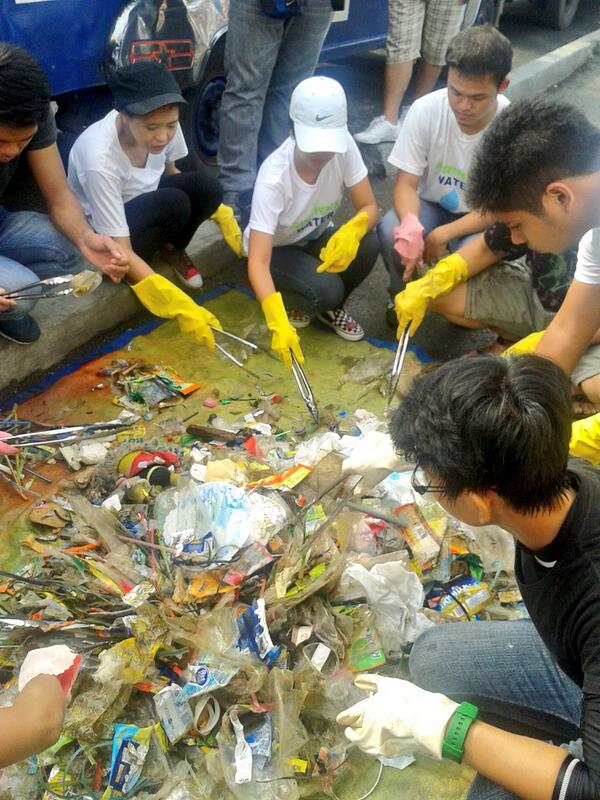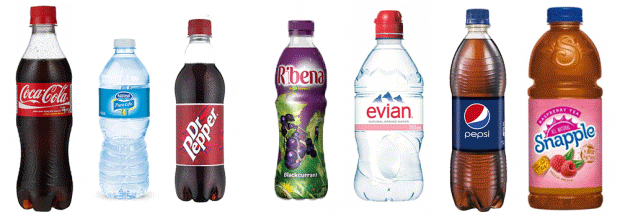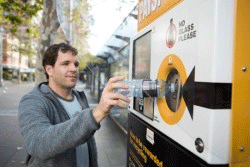
I love fizzy drinks, at the cinema with my snacks, at lunchtime always, at dinner, but never with breakfast, honest….
A love for fizzy drinks should never mean our oceans and the creatures who call it home, have to suffer, but every time we use brand new plastic bottles and don’t recycle them, that’s exactly what’s happening.
In the UK alone we use 35 million plastic bottles every day, but nearly half of these are not recycled.
We all love beaches, but hate it when we see plastic bottles and bottle tops ruining the view. Yet a truckload of plastic bottles, bottle tops and other plastic waste which isn’t being reused or recycled, is entering our ocean every single minute, which otherwise could have been reused or recycled.
Plastic can take centuries to break down and with plastic production set to double in the next 20 years and quadruple to 318 million tonnes by 2050, we need to curb the flow of plastics into our oceans and take drastic action to end the era of throwaway plastic, right now!
To tackle the problem we need the soft drinks industry to start taking serious action and fast.
The soft drinks industry have the power to end the flow of single-use plastic bottles into our oceans.
Greenpeace is calling on the industry to do more in the first-ever comprehensive survey of the plastic usage and policies of the biggest soft drinks brands which includes, Coca-Cola, PepsiCo, Suntory, Danone, Dr Pepper Snapple and Nestlé.
To read the full report Click here
Our survey results revealed a woeful lack of action by the soft drinks industry to prevent their plastic bottles ending up in our oceans.
- Of the six companies surveyed, five sell a combined total of 2.16 million tonnes of plastic bottles each year – the same weight as over 10,000 blue whales.
- The largest brand Coca-Cola refused to disclose the size of its plastic footprint, making the actual figure much higher.
- Despite producing 100% recyclable bottles and putting the onus on their customers to recycle, the top six biggest soft drinks companies use a combined average of just 6.6% recycled plastic in their products.
- None of the companies surveyed have commitments, targets or timelines to reduce the amount of single-use plastic bottles they use.
- Over the last ten years, these soft drinks companies have been consistently decreasing their use of refillable bottles, instead switching to yet more single-use plastic.
- Soft drinks companies are paying little attention to alternatives to single-use packaging, with only limited trials for soft drink dispensers or reusable bottles
Aakash Naik
Reducing our Plastic Footprint
Today, July 3, is International Plastic Bag Free Day. Globally, citizens and organizations are organizing activities highlighting the issue of plastic bag use and its effects, thereby strengthening the call to prohibit the use of single-use plastic bags.
The issue is in fact related to our daily life. The single-use plastic bag has now become a symbol of the consumer society and is practically ingrained in our lives. One plastic bag seems a little thing to be concerned about until you realize that millions are being thrown away every day. On the average, a plastic bag is used for 20 minutes before being thrown away. If we consider the number of disposable plastic bags, the population, the frequency of use, its inability to degrade for hundreds of years and all other variables – one only has to do the math to picture the worst possible scenario. Flooding, toxics and marine pollution do not even say it all.
The throwaway mentality that we have developed over the years through the use and availability of plastic bags has made it impossible for us to pursue a sustainable society. The convenience one single-use plastic bag offers is not worth the massive environmental and socio-economic problems that we are all bound to face eventually. Once we discard it, whether it ends up in our dust bins or in our waterways, it will never go away.
Plastic waste consistently remains top in generated waste during clean-ups and waste audits in Manila Bay. Data from discard surveys in 2006 and 2010 in Manila Bay show that among plastic products, plastic bags were the main waste contributor in terms of volume.
In the Philippines, many local government units are gradually going the right direction through ordinances banning the use of plastic bags. These are slow but sure steps, but a broader, more ambitious policy must be put in place. Enacting a nationwide ban on single-use plastic bags remains to be the call of many environmental groups. And this takes both communal and political will to achieve.

As Greenpeace, together with other groups, participates in yet another waste audit, the result may well serve as another grim reminder of the urgency of banning plastic bags and preventing them from entering our waste stream. By using single-use plastic bags, we’re honestly not doing Mother Earth a favour.
If each one of us says “no to plastic bags,” then we are giving out the right message. Doing away with plastic bags and going for reusables already offer a sustainable solution to the problem. It only takes little acts put together to make a big difference.
Alternatives are there. Practical solutions that people can easily understand, appreciate and practice are available. We can prevent the proliferation of single-use disposable products or short-lived ones. We can refuse to be part of this massive plastic pollution. We can reverse the situation and rise above plastics.
Abigail Aguilar is the Toxics Campaigner for Greenpeace Southeast Asia – Philippines.





